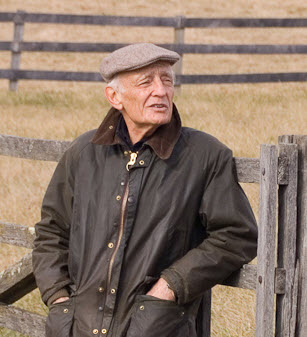animal rights
Kill Rate at PETA’s VA Shelter Is Eighty-One Percent
People for the Ethical Treatment of Animals (PETA) has reportedly threatened to close its animal shelter in Hampton Roads if the Virginia General Assembly passes Senate Bill 1381. The bill, which asks shelters to make a sincere effort to find adoptive homes before euthanizing animals, passed the House 95-2. It returns to the Senate for final passage before going before the governor. According to CBS, a state report shows that PETA euthanized eighty-one percent of the more than three thousand animals that it took into its Virginia shelter last year. PETA has been criticized for its high numbers of euthanasia. Click for the full CBS report. Posted February 24, 2015
Read More
Foxhunting Remains an Issue as Elections Loom in UK
In the runup to the May 7 elections in Britain, foxhunting and the Hunting Act that outlawed traditional hunting there in 2005 are once again subjects for polarized wrangling in the British media. While issues of greater import confront the nation as a whole, foxhunting remains a burning issue in rural areas. For many in those locales, their way of life was drastically altered by the nation’s voters, the majority (95%) of whom live in urban settings and were unaffected by the consequences of their vote. Although the ban was successfully pushed through by a vocal minority of animal rights activists and anti-toff sentiment, to the majority of urban dwellers, foxhunting is far down on their list of crucial issues and easy to quickly dismiss as frivolous. Once again, as he did in the runup to the last election, Prime Minister David Cameron declared last week that the countryside would not be forgotten. Cameron never fulfilled his initial campaign promise during the current session of Parliament because he and his pro-hunting supporters knew they didn’t have the votes to prevail. And once again, foes of hunting, noting the renewed rhetoric of the pro-hunting faction, have pledged through their sympathetic media channels that repeal will never happen. Click for more details in “WMN OPINION,” published by Western Morning News. Posted January, 12, 2015
Read More
ROI Low in Prosecuting England’s Foxhunters
The return on investment expended in the prosecution of foxhunters in England is abysmally low, yet the “social mission to purify” countryfolk persists, according to Michael Henderson in The Telegraph. The numbers are in. Of 110 people charged under the Hunting Act last year, fifty-six were found guilty. And most of those were poachers! According to the Countryside Alliance, only six of those fifty-six belonged to a registered hunt. The cost of bringing these few foxhunters to “justice” was in the millions of pounds, much of it furnished by the Royal Society for the Prevention of Cruelty to Animals (RSPCA) in snooping on foxhunters and funding prosecutions.The RSPCA spent more than three hundred thousand pounds prosecuting the Heythrop Hunt alone in 2012. Originally “established with the noblest of aims but which has degenerated into an association of zealots,” the RSPCA has even provoked the ire and condemnation of judges of the court with their freewheeling use of donors’ funds. Henderson reports that the RSPCA’s income from donations fell by seven million pounds last year. He writes, “There is valuable work for the RSPCA to do, but it doesn’t involve meddling in the lives of countrymen and women who pay their taxes on time and do their best by their neighbours. “For farmers, and for an increasing number of city-dwellers as well, Johnny Fox is not quite the cuddly chap some of these people think he is. They have better ways to spend their money. It is time, begging Fagin’s pardon, for them to review the situation.” Click for the complete article. Posted July 6, 2014
Read More
HSUS Sues Circus; Loses Big-Time
After fourteen years of litigation, the Humane Society of the United States (HSUS) and related animal rights groups settled a legal battle that they started against the parent company of Ringling Bros. and Barnum & Bailey Circus by agreeing to pay almost sixteen million dollars after a Federal Court determined that their case was “groundless and unreasonable.” This unprecedented settlement—paid for with proceeds received from the many thousands of well-meaning contributors who believe that HSUS is an honorable animal welfare charity—was the final outcome of a lawsuit that HSUS brought against the circus over the care of its Asian elephants. The lawsuit was found “frivolous,” “vexatious,” and “groundless and unreasonable from its inception” by the U.S. District Court. “We hope this settlement payment, and the various court decisions that found against these animal rights activists and their attorneys, will deter individuals and organizations from bringing frivolous litigation like this in the future,” said Kenneth Feld, Chairman and CEO of Feld Entertainment, the parent company of Ringling Bros. “This settlement is a significant milestone for our family-owned business and all the dedicated men and women who care for the Ringling Bros. herd of 42 Asian elephants. We look forward to continuing to set the standard for providing world-class care for all our animals and producing high quality, family entertainment.” Will the settlement payment deter frivolous actions in the future as Mr. Feld hopes? Unfortunately, not all targets of animal rights activism possess the financial resources to defend and then prosecute these organizations for their excesses. Just this week the state of Utah denied PETA (People for the Ethical Treatment of Animals) permission to erect a roadside memorial for hundreds of turkeys that were killed in a tractor trailer accident last month. Activists plan to appeal the decision. PETA has filed for similar memorials in other states to promote their vegan doctrine: chickens in Georgia and cows in New York City. To date, none of the requests have been allowed. Click for additional information on the HSUS settlement and the underlying litigation. Posted May 16, 2014
Read More
FBI Probe Links Animal Rights Threat to NYC Horse Carriage Issue
During his mayoral campaign, Mayor Bill de Blasio pledged to remove the iconic horse-drawn carriages from the city’s streets. The FBI is currently examining that pledge as it relates to contributions to an animal rights group, NYCLASS, and threats made to de Blasio’s chief rival in that mayoral race. Candidate de Blasio made his pledge to ban the horse carriages in March, 2013. The Daily News has disclosed that a political consultant for NYCLASS threatened to undermine Quinn’s campaign if she didn’t back the carriage horse ban. In April, Quinn, who was leading de Blasio in the polls at the time, refused to back the ban. That same April, two NYCLASS officials gave $200,000 to a PAC formed by their political consultant to carry out the “Anybody But Quinn” campaign. Records show that NYCLASS gave $225,000 to the anti-Quinn campaign in the months of May and June. Records also show that two of de Blasio’s top financial supporters gave $225,000 to NYCLASS. The FBI also appears interested in a $175,000 contribution to NYCLASS given by a union connected to de Blasio’s cousin, labor leader John Wilhelm. The attacks against Quinn—fueled by large contributions made by NYCLASS to the “Anybody But Quinn” campaign—began in April. The ad blitz attacked her candidacy with TV ads, robocalls, and mailings. By late June, Quinn had fallen to third place in the Democratic primary. De Blasio won the primary and later the mayoral election. Click for more details in Greg Smith’s New York Daily News article. Posted April 26, 2014
Read More
NYC Mayor Vows to Banish Horse Carriages
Two days before New York Mayor-Elect Bill de Blasio was to be sworn into office he vowed to eliminate the horse carriages that have for so long played a romantic role in Central Park. “It’s over,” he said. “We are going to quickly and aggressively move to make horse carriages no longer a part of the landscape in New York City. They are not humane. They are not appropriate to the year 2014.” While de Blasio’s announcement has elicited opposition, it appears that he comes to power with sufficient votes in the City Council to eliminate the sound of horse’s hooves from the streets of New York for all time. “De Blasio has handed animal rights activists a major victory. Harry Bruinius, staff writer for the Christian Science Monitor writes, “Liberals have swept into office across the city, and now PETA is in, and top hats—which many hansom cab riders wear—are out.” Click for more details in the CSM report. Posted January 4, 2014
Read More
Not Stupid; Just Misled
 A recent poll by the Opinion Research Corporation revealed that seventy-one percent of Americans believe that the Humane Society of the United States (HSUS) is an umbrella organization for local humane societies across the country. They’re wrong.
A recent poll by the Opinion Research Corporation revealed that seventy-one percent of Americans believe that the Humane Society of the United States (HSUS) is an umbrella organization for local humane societies across the country. They’re wrong.
Further, sixty-eight percent believe that donations made to HSUS help to fund these humane shelters. They’re ninety-nine percent wrong.
HSUS, according to IRS filings, gives one percent of their budget to animal shelters, according to JoAnn Alumbaugh’s article in Dairy Herd Network.
Are all these people wrong because they are stupid, or are they being misled?
Horse Slaughter Plants “Expected” to Open in NM, MO
Horse slaughter plants in New Mexico and Missouri expect to resume processing again in the U.S. in a matter of days. “Expect” is the operating word in this ongoing battle between the opposing views. Horse slaughter plants expected to open back in July of this year after the U.S. Department of Agriculture (USDA) cleared the way, but a last-moment appeal spearheaded by the Humane Society of the United States (HSUS) resulted in a temporary restraining order on the plant openings. That emergency ban has now been vacated by a federal appeals court, deciding that the humane organizations “failed to meet their burden” of proof that the injunction was necessary. The way is cleared once again for the plants to open. Most media news articles continue to approach this contentious issue from the horsemeat angle. The sensitivity of many in this country to the use of horses for human consumption is powerfully emotional, and such headlines sell newspapers. However, what the media mostly ignore in their coverage is that the Government Accounting Office (GAO), Congress’s independent investigative arm, bluntly reported to Congress in 2011, that horse welfare had been harmed by their legislation that resulted in the closing of all horse processing plants in this country. Prompted by animal rights groups, Congress, in 2006, passed a law which eliminated funding to the U.S. Department of Agriculture (USDA) for the inspection of horses in transit to slaughter and at slaughter facilities. Since existing law required USDA inspection, it was a back-door method of ending the slaughter of horses in the U.S. Within a year the last domestic slaughter house closed. At that time about 100,000 horses a year were being shipped to slaughter facilities. It was the ideological dream that these horses would somehow be absorbed by equine retirement facilities to spend the remainder of their natural lives in green fields tended by loving caretakers. That dream became a nightmare for horses. With retirement facilities unable to absorb even a small fraction of unwanted horses, the GAO reported that in 2010, 138,000 horses were exported to Mexico and Canada for slaughter. “The horses are traveling farther to meet the same end…in foreign slaughtering facilities where U.S. humane slaughtering protections do not apply,” said the GAO. The agency went on to say that horses are sometimes shipped in too small containers—conditions that were not allowed when USDA inspections applied. Not only have more horses been shipped greater distances under conditions unregulated by the USDA, to be slaughtered in facilities unregulated by the USDA for humane treatment, but thousands more horses are simply abandoned and neglected for lack of a commercial outlet that slaughter facilities used to provide. Horse slaughter may not be the best solution for the unwanted horse. Surely we must continue to pursue and develop all practical ideas that have come forward to solve the problem of unwanted horses in a kinder way. But the cessation of horse slaughter in the U.S. as the result of Congressional legislation has resulted in more suffering, not less, according to the GAO. Posted December 17, 2013
Read More
Temporary Injunction Delays Resumption of Horse Slaughter
On Monday, November 4, a federal appeals court granted an emergency request by animal rights groups to temporarily block the expected reopening of horse slaughter plants in the U.S. After eleven years, horse slaughter was expected to resume as early as this week after a U.S. District judge in New Mexico last Friday threw out a lawsuit brought by the Humane Society of the United States (HSUS) and other animal protection groups. The lawsuit by HSUS et al alleged that the US Department of Agriculture (USDA), responsible for inspection of processing plants, failed to carry out environmental reviews before granting approval to the three companies scheduled to resume slaughter. The district judge in New Mexico dismissed the suit on Friday, clearing the way for horse processing to resume. HSUS et al responded on Monday, in their emergency request to the 10th Circuit, by arguing that an emergency injunction was necessary to prevent environmental harm. A two-judge panel granted the request. The anticipated resumption of horse slaughter was enabled mainly by a General Accounting Office (GAO) report to Congress that their 2006 legislation resulting in the closing of all horse processing plants in this country actually turned out to be detrimental to horse welfare. For more details, click to read Terry Baynes’s Reuters article. Posted November 5, 2013
Read More
RSPCA Makes Overture to English Countryside
Stung by criticism of the staggering amount of money—£326,000—spent to prosecute the Heythrop hunt for violations of the Hunting Act, the Royal Society for the Prevention of Cruelty to Animals (RSPCA) is attempting to repair relations with the British countryside. (See earlier, related FHL article.) The Society has proposed the establishment of a new self-regulating hunting association—an independent trial and drag hunt association—that would open the country to riders and hounds following drag lines, or laid scents. Sir Barney White-Spunner, executive chairman of the Countryside Alliance, responded, “We are quite happy to talk to the RSPCA in the interests of animal welfare when they drop their increasingly radical and politicised animal rights agenda.” White-Spunner’s response was interesting in that it articulates a distinction which eludes many people: that animal welfare and animal rights are two very different philosophies. While animal welfare strives to care for all animals with compassion and enhance the well-being of all species, animal rights seeks to end man’s dominion over animals and endow them with the same rights as humans. Click to read Stuart Winter’s complete article in The Express. Posted July 22, 2013
Read More


















